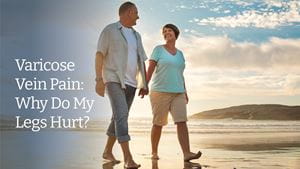
Varicose veins are a common condition that often goes undetected and untreated because people don't know how to recognize it. As a result, millions of people walk around with chronic varicose vein pain and never understand the underlying cause of their discomfort.
While many people mistakenly think varicose veins are only a cosmetic issue, they are actually a medical problem and can get progressively worse if treatment is not received.
Varicose veins occur when the blood in certain veins doesn’t flow properly and winds up pooling in the vein – most frequently in the legs and feet. The condition affects approximately 25-40 percent of all adults and is especially common among women. Symptoms may include:
Symptoms generally occur around the affected veins. In severe cases, dark or hard skin and even ulcers can form or the veins can swell, become discolored, or bleed excessively.
“There is a common misconception that varicose veins need to bulge out – making them easy to recognize and diagnose,” said Raj Pyne, MD, FSIR Medical Director of Rochester Regional Health’s Vein Treatment Center. “This is not always the case, which makes knowing the signs and symptoms of varicose veins very important.”
Blood only travels in one direction in your veins, thanks to valves that prevent backward flow. However, the valves in your veins can weaken and become less effective, allowing blood to pool in the legs.
If the valves in a person’s veins begin to weaken, blood can leak or flow the wrong way and accumulate in the veins, causing them to become swollen, enlarged, and painful.
Here are some of the potential risk factors for varicose veins:
There are a few ways in which people try to minimize painful symptoms. Some short-term measures that help to reduce pain and swelling include:
However, none of the above will reverse the effects of varicose veins – they only help to minimize the symptoms. If your condition worsens, schedule an appointment with a vein specialist as soon as possible. Most insurance plans will cover varicose vein treatments if you suffer from symptoms; check with your provider to see your level of coverage.
“At the Vein Treatment Center, our board-certified specialists are experts in a variety of minimally-invasive treatments for varicose veins,” Dr. Pyne said. “We will discuss each option together and determine what the best method of vein treatment is for you.”